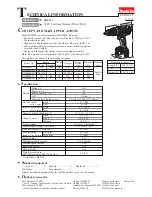
15
!WARNING!
Do not leave grill
unattended
while cooking!
Potential
BURN and FIRE
RISK!
2. Using the Grilling Surface (Cook Grids):
a) Grilling requires high heat for searing and proper browning.
b)
Most foods are cooked at the
“HI” heat setting for the entire cooking
duration.
c) When grilling large pieces of meat or poultry, it may be necessary to
turn the heat to a lower setting, after the initial searing. This allows
the food to cook through without burning the outside. Foods cooked for a long time or basted with a sugary
marinade may need a lower heat setting near the end of the cooking time.
d) Turn the control knob(s) to
“Hi” and preheat the grill for 8 minutes. (Time may vary based on climate)
Note: Keep the grill closed during preheating.
e) Place the food on the grill and cook to the desired doneness. Adjust heat setting, if necessary. The control
knobs may be set to any position between
“HI” and “LO”.
3. Using the Rotisserie Kit
:
a) Take off the rotisserie kit (spit rod & forks assembly) from the grill.
b) Loosen and slide the left fork off of the spit rod.
c) Load the meat or poultry onto the spit rod; center the meat as much as possible. Do not exceed 12 lbs.
d) Re-install the left fork, then slide the two forks into the meat to secure.
e) Center forks and meat on the spit rod, then tighten down the fork wing nuts
f) If the meat has any loose portions, wrap the meat with butcher
’s string (never use nylon or plastic)
g) Re-install the rotisserie kit into your grill, ensuring that the pointed end is fitted into the motor.
h) Ensure the meat is at least two inches away from the infrared burner and any excess fat is removed. Fat is
very flammable and should be a safe distance away from the burner for best results.
4. Tips for ROTISSERIE cooking
:
a) When using the rotisserie, the meat should be centered on the spit rod, after which it must be balanced. To
balance the meat, first rotate the cut so that heaviest side is facing downwards. Next, position the counter
balance so that it faces upwards. Secure in place by tightening the counter balance wing nut. Check the
rotisserie function to ensure that the spit is rotating freely. It may be necessary to adjust the counter
balance weight in or out, to achieve a smooth rotation.
b) Place a drip pan on top of the upper flavor shields and position the pan directly beneath the food on the
spit rod. Depending on the flavor you desire, place liquid in the pan such as, water, juices or wine, chop up
onions or add garlic, As the juices fall from the meat they will mix with the liquid and evaporate directly into
the meat, this removes the need for manual basting as this is a self-basting system.
c) Do not let the drip tray dry out.
d) You are now ready to rotisserie cook!
e) Season meat or poultry as desired, then light the rotisserie burner (refer to instructions in this manual).
f) Always use a meat thermometer to determine how well the meat is cooked. Insert the thermometer into the
center of the meat. Do not allow the thermometer to touch a bone as this will not give an accurate reading
on the meat thermometer. When checking poultry, the best location to insert the thermometer is in the
center of the thigh muscle, next to the body.
g) Close lid while cooking.
5. Using the Dual Zone Side Burner
:
a) LIGHTING: Push in and rotate the control knob counter clockwise
slowly, to the
“HI” position. (Rotate for a two second count). The built-in
igniter will click and spark, lighting the torch-light pilot flame, then the
main burner. If the burner does not light IMMEDIATELY, turn the knob to
off and wait 5 minutes. Repeat lighting procedure.
b) To use the simmer feature, turn the lit side burner down to its lowest
setting. The center simmer burner will remain lit; this provides a low but
steady heat for melting butter, simmering or keeping foods warm.
Note:
Please keep your rotisserie kit in a warm and dry area when not in use. Clean all
components well after every use. Leaving food products and other environmental
particulate matter on the surfaces of these components can cause them to have
surface rust. This can be polished out, sometimes with a lot of effort.








































